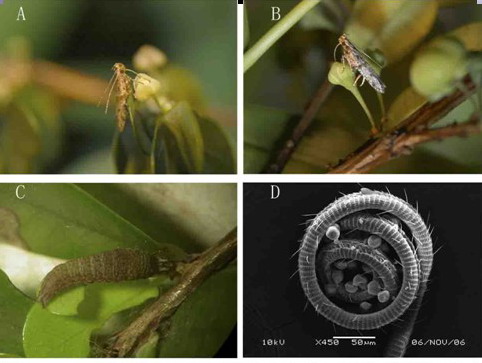South China Botanical Garden Finds Obligate Pollinators can Breakdown Sporopollenin
Sporopollenin is a complex polymer that is composed of fatty acids and phenolic compounds. The precise structure of sporopollenin is unknown. Sporopollenin is resistant to nonoxidative physical, chemical, and biological treatments and insoluble in both aqueous and organic solvents. This chemical inertness accounts for the preservation of pollen grains for tens to hundreds of millions of years. Many insects feed on pollen surface lipids and contents accessible through the germination pores, but none of them can break down pollen walls.
After four years field observations and experiments in tropical China, Dr. LUO Shixiao from Research Group of Plant Phylogenetics and Reproductive Biology, South China Botanical Garden, revealed that two species of Deltophora (Gelechioidea) are the exclusive pollinators of two species of Phyllanthus (Phyllanthaceae) on which their larvae develop and from which the adults take pollen and nectar. No other insects visited the flowers of hot plants, and the moths’ entire life cycle is adapted to their host plants’ phenology and chemistry. The results showed that Phyllanthus cochinchinensis and Deltophora sp. 1, and P. rheophyticus and Deltophora sp. 2 are two new pairs of obligate mutualists.
Captive moths with pollen on their mouthparts after 2-3 days of starvation no longer carried intact grains, and SEM photographs showed exine fragments on their proboscises. This is the first report of any insect and indeed any animal chemically dissolving pollen.
These results were published recently in the famous journal PLoS ONE on line (2011, http://www.plosone.org/article/info%3Adoi%2F10.1371%2Fjournal.pone.0019219).

A. Deltophora moth drinking nectar from a male flower. B. Deltophora moth drinking nectar from a female flower. C. Larva of Deltophora on a young leaf. D. Pollen-coated proboscis of Deltophora smoth.
File Download: